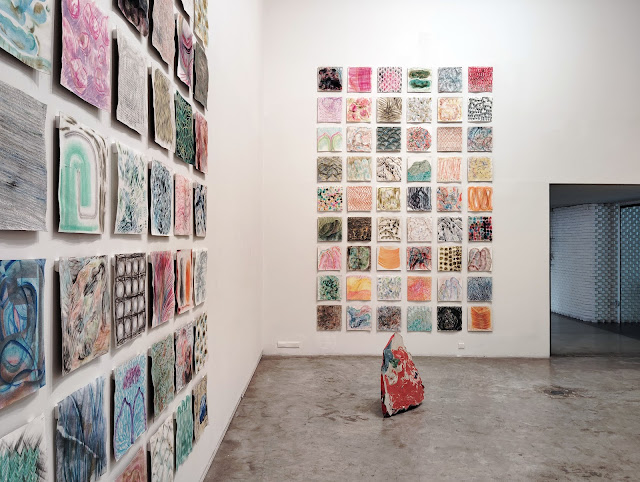Foteini Palpana - COLOURGROUND
Foteini
Palpana's second solo exhibition at the Ileana Tounta Contemporary Art Center
is a dialogue between her sculptural work and her new paintings.
The exhibition
features the installation "Islands on my mind grow on my back"
(2021), with the characteristic layering of cementitious materials in vibrant
colours, and the painting composition "Soft Paintings: I had so much
painting in me!" (oil pastel on synthetic napped fabrics), which Palpana
has been working on over the past year.
The two bodies
of work coexist, reflecting and expanding upon each other. The sculptures occupy
space as coloured matter solidified into geological formations, while the
painted images, created with "controlled spontaneity" and a playful
disposition, maintain, in their abstract forms, references to the body as well
as the landscape and the ground.
The natural environment constitutes a constant
reference in Palpana's artistic practice, both as a starting point for
exploring different categories of representation, and as a field of interaction
and sensory perception. Through the use of diverse materials and media her work
manifests as installations-environments with the features of geological
formations, fragmentary landscapes to be read or deciphered,
where the human presence is involved to a greater or lesser extent.
Her voluminous sculptures of cementitious
materials in the form of rocks, islands or pieces of earth have been coexisting
for the last five years with works made of fabric, which the artist manipulates
in sculptural and painterly manners. As Christoforos
Marinos points out in the text "The Dreamscapes of Foteini Palpana,"
included in the recent publication "Islands Grow" (Athens 2025):
"[...]
Foteini Palpana seems to have a good understanding of the limits of painting
and sculptural representation of a space or place. Her latest paintings, made
with oil pastel on synthetic fabrics, are created with controlled spontaneity. As she says, they contain (her)
thought and at the same time they reproduce it. They constitute, therefore,
preeminently reflective images. They possess the depth, weight, and
impulsiveness of thought, as well as the lightness of a reflection, its sudden,
lightning appearance, its fleeting path, its flash. These images are the same
size, soft—due to the pile of the fabric—and abstract, without of course
lacking representational traces. They are usually presented in a grid, with a
small distance between them, as this highlights in a better way the patterns of
thought and the elective affinities, the relationships between the images. Seen
all together, they resemble a mural that combines the rational and the
expressionistic, the Apollonian and the Dionysian. These images possess
musicality, a rhythmology. Within this grid, you can identify condensed times,
interacting moments and mental states.
Palpana's
painted images possess autonomy, clarity. [...] they combine painting with
drawing and sculpture. And most importantly: they are thought-images that
spring from the body, from the artist's gut. "I had so much painting in
me..." she thinks as she produces these images—a phrase that may well be
reformulated as a question to herself: "Did I really have so much painting
in my body and didn't know it? [...]"









